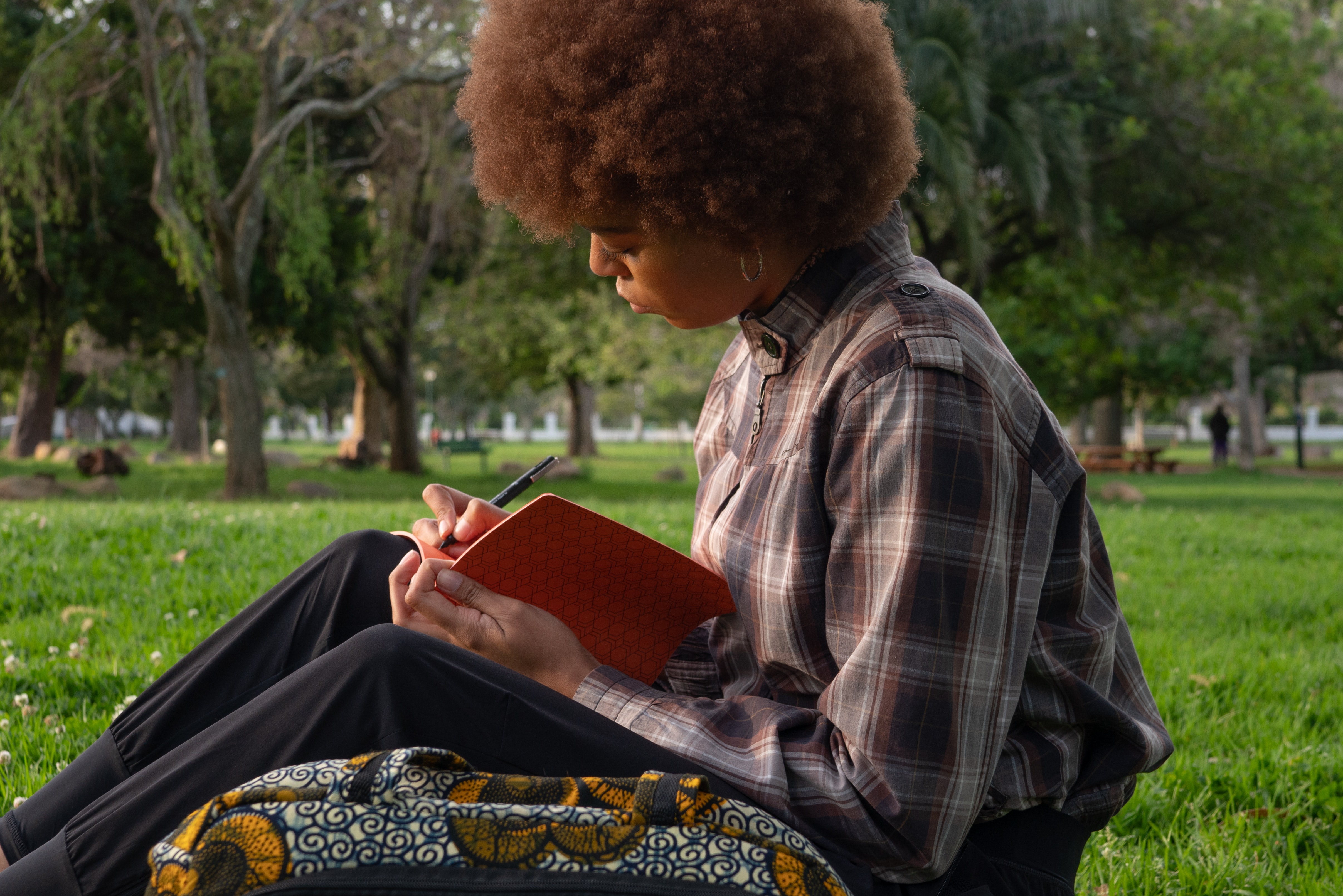My life has been a series of movements. The first house I remember living in was a three-bedroom apartment in a block of flats in Warri, a small southern Nigerian town. The apartment had grey and black terrazzo floors, a narrow verandah enclosed by white metal grating with spaces through which my brother and I enjoyed contorting our bodies. It was in that flat that I learned to read, developed an intense fear of the dark, learned to ride a bicycle and made my older brother’s life very miserable, as any self-respecting younger sibling should. This place was home till I was about eight or nine, when my family moved into an even quieter residential neighborhood, this one with paved roads, near-constant electricity, a community center and a large playground. Our home here was a lovely bungalow with a manicured lawn and neatly-trimmed hedges separating our house from the neighbors’ and theirs from their neighbors. I learned—reluctantly—to chop onions in this home and celebrated my tenth birthday covered in newly crusted over chicken pox rashes. It was also while living in this house that on a dry, harmattan day one year, I—unintentionally—set fire to the playground and my lovely big brother sprung into action and put the fire out before the fire department came. We still got in trouble.
At ten, (yes, ten and I turned out fine, thank you) I moved away to boarding school, a rite of passage for many Nigerian children. At my small Catholic boarding school on the outskirts of Abuja, Nigeria’s capital, my hair was cut short—buzz cut short—and students rotated dormitories and dining tables every year. We were split into four houses (naturally, named after Jesuit saints; I was in Regis House), wore uniforms (white shirt and dark blue skirt for the morning, red checkered dress afterwards) and had prefects (proudly, Regis House prefect in year five)—yes, like Harry Potter, as my American friends are fond of remarking. We went back to our parents and guardians, three times a year: Christmas, Easter and “Summer” (there are really only two seasons in Nigeria—dry and rainy). So, understandably, these teenagers with whom I spent the majority of six impressionable years became a home of sorts. It was with them that I discovered the intensity of young friendships and began to accumulate definitions for love. It was in our shared home that I fell in love with mathematics, and explored the boundaries and workings of my most consistent home, my body. After graduation, I moved again, this time to a two-story house with a low, sandblasted fence, a small yard and outdoor tented parking. This home was in Lagos, Nigeria’s social capital, with its electrifying chaos and undeniable ambition. I learned to drive here, worked on college applications and found faith.
A few months after I turned 17, I moved to the US for college in a small, old industrial town in western Massachusetts. Here, I met women from around the world, with whom I explored questions about identity and place. I continued my love affair with mathematics but found my mind stretching even more as I delved into African and African American history, theatre and writing. I moved around too while at college, by the end of my four years, becoming well-accustomed to shuttling earthly possessions via crammed car or makeshift trolley around campus from old dormitories to storage in kind professors’ houses and then back to new dormitories at the beginning of the school year. After college, I lived in a cozy, second-floor apartment in a Boston neighborhood, just outside the gentrification perimeter, and then a year after, moved to rural New Hampshire for graduate school. In my five-year graduate school career, I lived in three homes, across two states (second one, Vermont), surrounded by housemates and neighbors, who quickly became family.
Last summer, I packed what would fit in my silver hatchback and drove 22 hours across the country to yet another new home. I have now spent the last ten months living in southeast Minnesota. I live in a one-bedroom apartment with vinyl wood flooring, a small porch, and east-facing windows I wish were larger. My only living roommate is an obstinate Peace lily plant that lives in a burnt orange pot and hasn’t flowered in almost two years. I don’t know my neighbors. I’ve thought a lot about loneliness and isolation this year and reflected on the many places and people I’ve made homes in over the years. As I attempt to navigate life in yet another new town, with its new faces and unfamiliar places, I find myself asking how I dealt with novelty in the past. My answer: I wrote. Writing has been a constant throughout my string of movements. It’s been the way I have explored my interactions with changing environments, internal and external. When faced with the isolation that can emerge in new spaces, writing has served as the vehicle through which I have befriended myself, and then found home in others. Writing, for me, has been community.
In my small Catholic boarding school with its rotating dormitories and tables, I discovered that in writing one’s thoughts, one could start to order them, start to speak peace to whirlwind emotions, aggravated by raging hormones. I learned that when it was difficult to articulate how I felt, or when it seemed no one was really listening, once pen touched paper, someone had finally heard—even if that person was me. Within the pale blue walls of my room in my Lagos home, writing again ushered me into a community that lit the way out of my phobia of darkness (yes, I was scared of the dark well into my teenage years). For the duration of the year I lived in that house after secondary school, in the daytime, I wrote down what felt like hundreds of scripture verses on courage, fear, and light in my journal. At night, when it grew dark—and it can get really dark in Lagos—I would recite these verses out loud to myself. It seemed like meaningless repetition at first, but eventually something changed and I got less scared each time. In writing and reciting those scriptures, I was connecting to the community of people who had first written them down, and had used them to war against challenges, and had come out, in one way or the other, victorious. In the darkness, I was never really alone. I had a family of people lining my path with light.
Yet again, in one of the houses I lived in as a graduate student, a tan, two-story house with a shared yard occasionally frequented by black bears, I stumbled on the catharsis of poetry and began sharing my writing with friends and classmates. Through sharing my words, a whole new community emerged for me, a community of people I could touch, talk to, share a meal with, and of others, who though far away, were tangible still. Many of their stories mirrored mine, and were thus incredibly validating, others spoke to me because they were different. Throughout my life, writing has crafted new friendships for me and deepened old ones. And so over the past ten months, in my small one-bedroom Minnesota apartment with east-facing windows, I have held on to writing as a life-line, as an antidote to isolation. It has (mostly) worked, although it turns out even introverts need in-person human interaction.
A few months ago, my dad sent me a copy of a diary-like reflection I had written at eight after a family vacation. The first page read: Once upon a summer, a girl called Tolu went on an adventure to the City of London. She invites you to share her time with her. The last page read: …some days after[,] we were on the plane back to Nigeria. It was really nice to be back Home. Uppercase H. Everywhere else, to describe the houses and apartments we stayed in that summer, I had spelled “home” with a lowercase “h.” It is interesting that at eight, I felt it was necessary to distinguish Home from all the other roofs I had been under. But sometimes home becomes Home.
Today, in the face of an unprecedented pandemic in which isolation has become the prescription, not the disease, there is the real threat that this home, riddled with uncertainty, will last long enough that it starts to become Home. I am hoping it does not. But as isolation deepens, and movements reduce, I am holding even more tightly to my imperfect solution. Just as writing has lined my life’s movements, even now, in stillness, it will remain the tool through which I will continue to explore the communities within myself and build bridges to those in others. As I sit at home, with none other than my stubborn plant-roommate, I will remind myself that as long as I can write, I am never truly alone.


